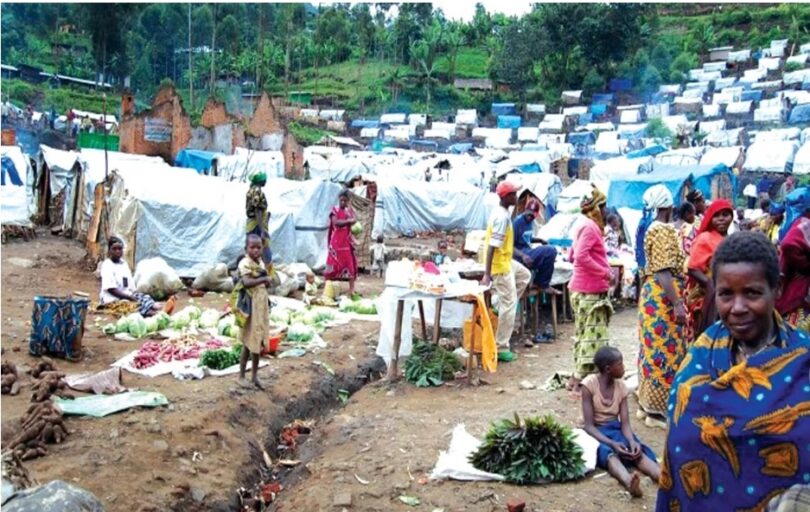A grave humanitarian crisis characterized by rising violence, extensive malnutrition, and recurring disease outbreaks looms over Northwest Nigeria. This region, formerly rich with resources, culture, and peace, has been taken over by tribal and religious violence. This has triggered the displacement of more than 600,000 people in recent years due to a combination of extremely violent attacks, harsh economic conditions, and climate change impacts.
Armed banditry and kidnapping have caused persistent violence in the states of Zamfara, Sokoto, Katsina, and Kebbi. The impact has been severe, with over 2,000 people losing their lives in more than 1,000 violent incidents recorded by the Armed Conflict Location & Event Data Project (ACLED) in 2022 alone. More recent data has shown an even worse reality, with bandit groups holding control over large swaths of land and even demanding tax from residents. Displaced residents are grappling with loss of livelihoods due to the inability to access farms for sustenance coupled with difficulty accessing healthcare services as well as other necessities such as food.
Between December 2022 and February 2023, northwest Nigeria was declared to be one of the most perilous regions in the country by ACLED after they recorded a staggering number of deaths stemming from violent incidents, which amounted to 709.
The International Rescue Committee (IRC) has expressed worries about the humanitarian fallout of increasing insecurity in Sokoto and Zamfara states. In March and April 2024, armed attacks displaced over 10,000 individuals and killed at least 92 others- numerous unreported kidnappings also took place. Those evicted are commonly left with minimal possessions in open areas without access to essential amenities; women make up more than half of those impacted by this crisis, rendering them particularly susceptible to exploitation or violence. Adamawa, Borno & Yobe States have over 8 million people dependent on public aid.
The origin of the conflict can be traced back to enduring problems such as land and water resource rivalry, which have been amplified by climate change and ecological deterioration. It can also be placed squarely on the rampage of the infamous terrorist sect, Boko Haram. Opportunistic factions have also capitalized on these disputes, resorting to violent assaults, abductions, and thefts of livestock that inflict physical damage while also disturbing the socio-economic equilibrium within impacted regions.
Displacement on a massive scale
In Zamfara, Katsina and Sokoto states, the continuous unrest has caused more than 450,000 individuals to be displaced. Internally displaced persons (IDPs) have been confronted with daunting difficulties such as inadequate supply of fundamental requirements like food, water and shelter. Due to the scarcity of established camps for those who are evacuated from their homes, many find themselves having no other choice but to turn towards the failing societies which aren’t well-capacitated in terms of resources or infrastructure and, in extreme cases, getting sucked into the violent life. This is a serious problem for children who have to grow up in this condition.
The risk of bandit assaults during transportation presents considerable security challenges, which heavily restrict movement in the regions of Zamfara and Katsina. Due to roadblocks, inadequate means of travel, and financial struggles, IDPs often seek alternative routes through remote areas to avoid these attacks. Despite such difficulties, however, displacements within Local Government Areas (LGAs) are common across both states – with longer journeys towards state headquarters being more frequent in Sokoto due to better facilities for aid support.
The prevalence of multiple displacements and re-displacements is notable in Katsina and Zamfara, affecting a significant percentage of households. To ensure safety, IDPs frequently move between their original areas and locations of displacement, resulting in daily upheavals. The disruption to families during this time can be substantial with varying rates for reunification amongst different states.

The crisis of malnutrition
In Northwest Nigeria, malnutrition is an alarming problem affecting children in particular. The continuous conflict and displacement have led to a significant rise in severe acute malnutrition cases (SAM). According to Médecins Sans Frontières (MSF), there has been a notable surge of SAM, measles, malaria and diarrheal disease treatment among kids during the first four months of 2024. This represents a staggering growth rate of 54% compared to last year’s statistics.
The major factors responsible for malnutrition are agricultural disruptions, scarcity and inflation of food prices. As said earlier, the fear of attacks has hindered farmers from farming their lands, thus resulting in reduced yield output. Furthermore, the displacement caused by such conflicts has disrupted traditional supply chains, contributing to further exacerbation of the food shortage crisis. Inadequate sanitation facilities and unavailability of clean water sources also play a significant role in worsening nutritional struggles amongst the populace.
Outbreaks of diseases
Poor living conditions among displaced populations have provided a breeding ground for disease outbreaks. Inadequate sanitation and overcrowding are responsible for the widespread incidence of preventable ailments, including but not limited to measles, malaria, and diarrhoea. Furthermore, malnutrition and poor hygiene in these areas have led to an upsurge in Noma cases- a fatal gangrenous infection that affects facial tissue.

The displaced populations are facing noteworthy health obstacles pointed out by MSF, which include limited medical care accessibility and a high incidence of diseases related to malnutrition. The healthcare infrastructure in the area is markedly under-equipped, posing difficulties in disease control as well as timely medical assistance provision.
Impacts on Society and the Economy
Northwest Nigeria has been deeply affected by the humanitarian crisis, with significant social and economic consequences. The turmoil and displacement have shattered established societal norms, causing fragmentation in community unity as well as traditional support networks. Individuals who are displaced – particularly those who farm or rear livestock – experienced a loss of income, leading to elevated levels of poverty and food insecurity among both host communities and refugees.
The crisis has had a noteworthy economic effect. The curtailing of agricultural operations resulted in decreased food yield and elevated prices, thus aggravating the issue of food unavailability in that area. Furthermore, people losing their means to make ends meet reduced their ability to purchase necessities for themselves and made it arduous for them to fulfil basic requirements as well.

The crisis has had a severe impact on the health and well-being of those affected, with increased rates of morbidity and mortality due to widespread malnutrition and disease outbreaks. Among these vulnerable populations, children are particularly at risk for conditions such as severe acute malnutrition, measles, and malaria that could have been prevented with proper medical care. Unfortunately, access to healthcare services is limited, making it difficult to provide timely treatment, exacerbating their already challenging circumstances.
The crisis has also had a notable psychological effect as well. Numerous displaced persons have gone through distressing occurrences such as violence, familial losses, and forced relocation. Due to the scarcity of mental health amenities and psychosocial aid, many are grappling with their emotional anguish and strain.
Insufficient Humanitarian Response.
Despite the seriousness of the crisis, there has been a significant shortfall in humanitarian aid. A recent survey conducted by REACH disclosed that just 10% of affected families were granted any form of help over the last half-year period. Restricted assistance furnished by Nigerian authorities and local NGOs failed to adequately satisfy fundamental necessities for displaced communities.
The situation has been worsened by the inadequate collaboration among aid agencies. Numerous communities in need are uninformed about how to obtain help or enroll for assistance. The lack of a unified system for dispensing aid has resulted in ineffectiveness and insufficiencies regarding service delivery. Moreover, most individuals who received any kind of support have conveyed their discontentment with both the quality and amount provided.
Significant governance and security challenges in Northwest Nigeria have been exposed by the ongoing humanitarian crisis. The incapacity of the government to effectively deal with violence, safeguard affected communities, or offer them necessary help has diminished public confidence in state institutions. An atmosphere characterized by lawlessness and impunity has resulted from both armed group presence and inefficient security measures, aggravating an already dire situation.
Numerous questions have also been raised regarding the Nigerian government’s ability and dedication to fulfilling its citizens’ needs due to a disorganized and inadequate humanitarian response. Neglected and abandoned sentiments persist among those left without sustainable solutions, as there is no comprehensive plan in place to address the crisis at its roots.








